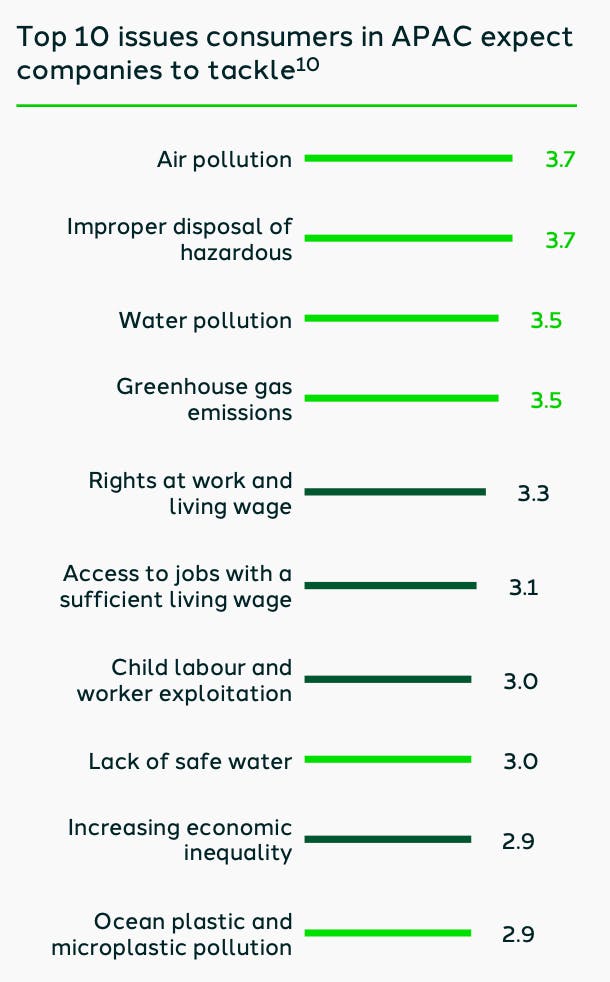The environmental and social problems that concern Asian businesses differ starkly from those that worry their consumers, a new study of marketing professionals finds.
To continue reading, subscribe to Eco‑Business.
There's something for everyone. We offer a range of subscription plans.
- Access our stories and receive our Insights Weekly newsletter with the free EB Member plan.
- Unlock unlimited access to our content and archive with EB Circle.
- Publish your content with EB Premium.
While consumers fret about local issues such as pollution and badly managed waste, businesses in the region worry more about broader systemic issues such as greenhouse gas emissions, labour rights and ocean plastic, according to a survey by advertising agency Dentsu and market research firm Kantar.
Businesses in the region are struggling to connect with the issues that matter to the people who buy their products, the research suggested.
The role of marketing in driving consumption has increasingly come under the spotlight in recent years, with the United Nations urging the industry to align marketing programmes with the Sustainable Development Goals to steer campaigns towards good causes.
“Marketers in the region don’t feel empowered or have the right support to drive action around sustainability objectives, so they often don’t communicate and enable consumers to make the right choices in sustainable products,” said Dominic Powers, chief growth officer, Asia Pacific for Dentsu.
Traditionally, the marketing function has been geared towards driving consumption, but its role needs to change to better understand consumer needs and drive innovation around sustainable products and services, Powers argued.
The study also found that consumer attitudes towards sustainability are not translating into action.
According to the study, which surveyed 34,000 people across 35 countries globally, 98 per cent of Asia Pacific consumers are prepared to take action to live a more sustainable lifestyle, but only 17 per cent say they are actively changing their behaviour. More than half (58 per cent) say they find it really hard to tell which products are ethical and which are not.
A lack of information and transparency on how sustainable brands are, combined with rising living costs, are putting consumers off choosing greener options, the study finds.
“We are seeing a kind of apathy towards sustainability at the consumer level in Asia Pacific,” said Powers, noting that global brands in particular are running sustainability programmes that do not translate well in local markets.
Using Singapore as an example, he said consumers generally look to the government to solve environmental problems such as waste, which is well managed in the city-state.
“That creates apathy. People say there are interested in sustainability and changing their lifestyle, but are not actually doing it – there is an intention-action gap,” he said.
Marketing lagging

Air pollution is the top issue consumers in Asia Pacific expect companies to tackle. Source: Marketing a better future report
The study found that consumers expect businesses to tackle sustainability issues that affect them locally.
The two main issues that consumers expect businesses to tackle are air pollution and the improper disposal of hazardous waste – issues that are of particular concern in developing nations where environmental degradation is acute, like India, Vietnam and Thailand.
The study surveyed 71 marketers in countries including Singapore, Malaysia, Indonesia, China, Australia, New Zealand, India, and the Phiilippines, and found that they regard sustainability to be important for pragmatic reasons.
Almost three-quarters of businesses think sustainability is important for business survival and growth over the long term, and more than half believe that it is important because consumer preferences have shifted to more sustainable options.
Two-thirds say they think sustainability is important because it “is the right thing to do”.
The smallest proportion of Asian marketers (8 per cent) think sustainability is important because it will lead to cost savings.
Business in Asia are struggling to align with consumers on the environmental and social issues that matter, partly because marketing departments – whose role is to understand and drive consumer behaviour – lack the skills and tools to influence or measure sustainability programmes, and do not play a central role in a company’s sustainability function, the study contends.
While business functions including corporate strategy and supply chain operations report solid progress in executing against a business’s sustainability plan and measuring progress, the marketing function is well behind in this regard.
Marketers also say they are struggling to communicate the value of sustainability and prove that programmes have a positive, measurable impact.
Some 44 per cent of those surveyed said they are unsure of what consumers think of their brand’s sustainability efforts, while 37 per cent worry that their company’s sustainability initiatives are seen as inauthentic.
Marketing agencies are also under growing pressure to rein in their environmental impact by dropping carbon-intensive clients. Dentsu was among the companies targeted in a campaign that highlights the fossil fuel clients that agencies work for. The Japan-headquartered firm works for the likes of Chevron, Indian Energy and TotalEnergies.
Powers said that brands that Dentsu work with do have their challenges. “We believe that no brand should be left behind if they are making an active push to change,” he told Eco-Business.








